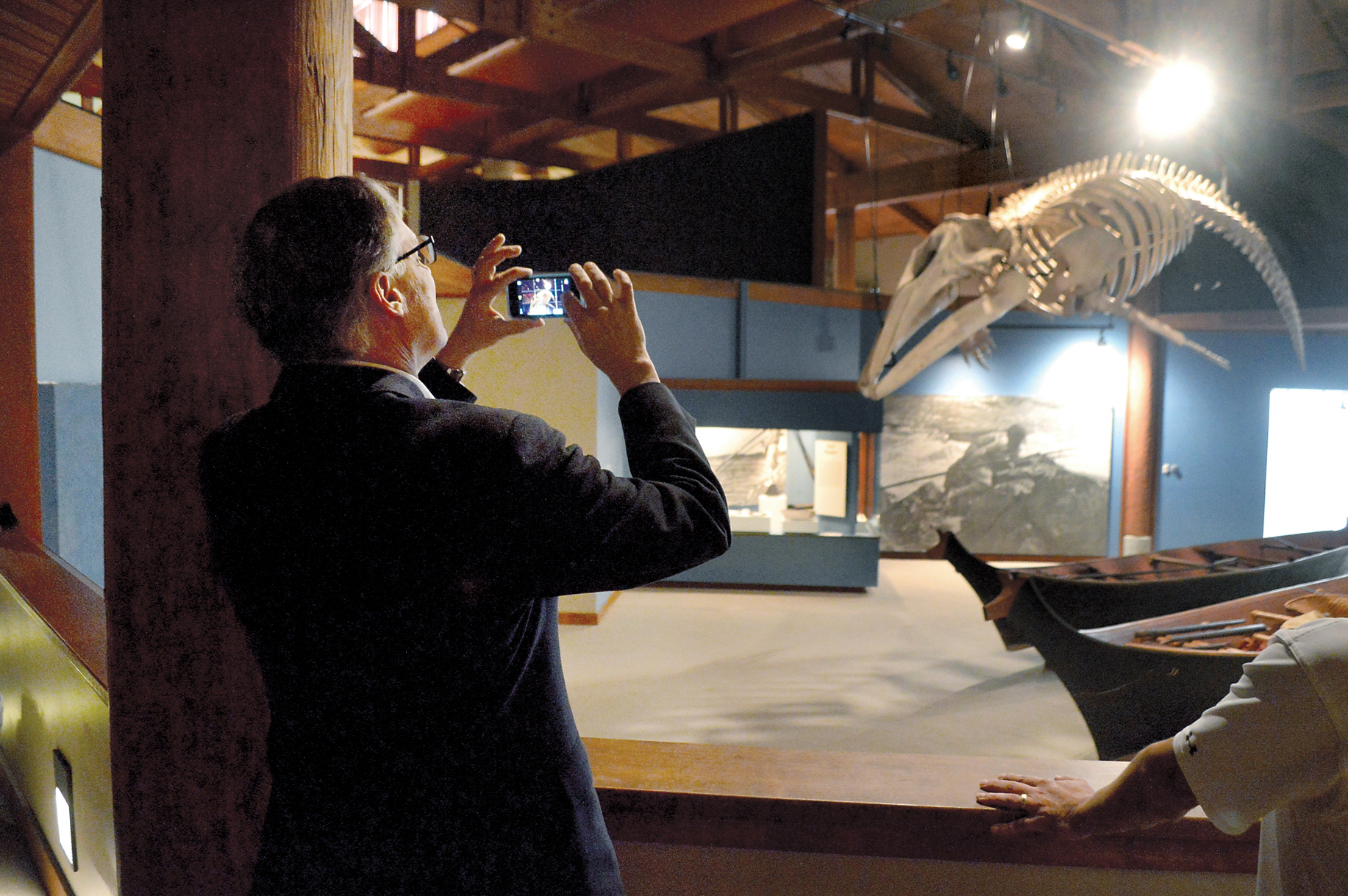NEAH BAY –– Environmental issues dominated discussion as Gov. Jay Inslee met with leaders of West End Native American tribes in his first visit to the North Olympic Peninsula as the state’s chief executive.
Inslee spoke Friday with Quileute and Hoh tribal officials about their efforts to move out of tsunami zones and with the Makah about the need for a multi-agency committee for oversight of oil and coal freight ships in the Strait of Juan de Fuca.
“I’m impressed with these three tribes because they seem to be very cohesive, very well-led and very forward-thinking,” Inslee told the Peninsula Daily News on Friday evening.
“We’re having changes. The climate is changing. And there’s leadership here in all the tribes that realizes you have to be dynamic, you have to think ahead.”
Inslee flew into Sekiu Airport on Friday morning and drove with a State Patrol escort to the Hoh and Quileute reservations before returning north to speak with the Makah.
“Marine resources are for us, as a tribe, our most important resource,” Makah Chairman T.J. Greene told Inslee.
Chad Bowechamp, Makah marine affairs manager, told the governor of efforts the tribe has led to get support from tribal, state, national and Canadian authorities to put together spill response programs for the expected increase of oil from Canadian tar sand fields out of Vancouver, B.C., and U.S. oil shipments out of Cherry Point near Bellingham.
Bowechamp said he already had begun working on the issue with state Department of Ecology Director Maia Bellon, who accompanied Inslee on Friday’s trip. She is married to Bill Kallapa, a Makah tribal member.
The efforts, Bowechamp said, are driven by the “religious reverence we [the tribe] hold for the ocean.”
Inslee said the state has a limited role in what it can do for the tribes but that it was important to cultivate “government-to-government” relationships
The primary discussion topic with the Hoh and Quileute tribes was their efforts to move their reservations out of tsunami zones, Inslee told the PDN.
“We saw with the Quileutes this really visionary way to move up to higher ground,” Inslee said.
He noted that as a congressman representing the 1st Congressional District, he had helped pass bills to allow the tribes higher ground.
In February 2012, President Barack Obama signed into law the bill that gave the tribe 785 nearby acres of Olympic National Park, including 275 acres where the tribal headquarters, school day care center and elder center can move, and 510 acres of ceremonial land to resolve a decades-long boundary dispute with the park.
In 2010, legislation was passed that transferred 37 acres of park to the Hoh tribe and placed another 425 acres it bought over the past three years into trust.
Inslee represented the state’s 4th Congressional District from 1993 to 1995 and the 1st Congressional District from 1999 to 2012.
Noting that most efforts are driven by federal agencies, he said he would lend whatever support the state could to both tribes.
“We don’t have anything right now that we can say,” he said. “But we’re definitely going to be looking when there’s something we might be able to do.”
All three tribes, located on the remote end of the Peninsula, asked for the governor’s help in bringing high-speed broadband to their communities.
“It’s so important. These kids are so ambitious. They want — and they have to — compete on an international basis,” Inslee said.
“And educationally, that’s really tough without a good, solid infrastructure”
He may pursue help from the state’s Community Economic and Revitalization Board to bring broadband to the West End tribes but said a provider and business are needed.
“I almost hesitate to even mention it because I don’t know if it will happen or not,” he said.
Inslee said his office would try to bring together members of the West End tribes with the Lower Elwha Klallam, Jamestown S’Klallam and Port Gamble S’Klallam to resolve a dispute over access to hunting grounds.
The state Department of Fish and Wildlife in October determined the eastern tribes should have access to hunt in off-reservation areas of the Sol Duc, Pysht and Dickey game management units under the 1855 Point No Point Treaty.
The Quileute objected to the decision.
“There’s some questions. There’s some ambiguity between the tribes as to hunting rights issues that we want to resolve,” Inslee said.
“What we need to do is encourage talks between tribes and between the tribes and the state to get a resolution with that”
Inslee spoke to a crowd of dozens at the first Drexler Doherty All-Native Basketball Tournament, which had 16 teams from tribes as far away as Montana competing over the weekend.
The tournament was organized to pay tribute to Doherty, who starred for the Neah Bay High School basketball team before dying unexpectedly last October at the age of 21.
“We’ve come to pay tribute to a great basketball player and a great young man,” Inslee said of Doherty.
“And I know he’s still here in our hears today.”
Doherty was Kallapa’s nephew.
Inslee, noted for his high school athleticism, was expected to play — Makah officials even offered to make him a member of their tribe for the game — but his meeting before the tournament ran long, and the cowboy-boot-wearing governor did not pick up a ball.
He spoke with Doherty’s family at the tournament before leaving.
“That’s pretty awesome to have a guest like that,” said Kenrick Doherty, Drexler’s father.
“I think Drexler would have scored on him.”
________
Sequim-Dungeness Valley Editor Joe Smillie can be reached at 360-681-2390, ext. 5052, or at jsmillie@peninsuladailynews.com.
